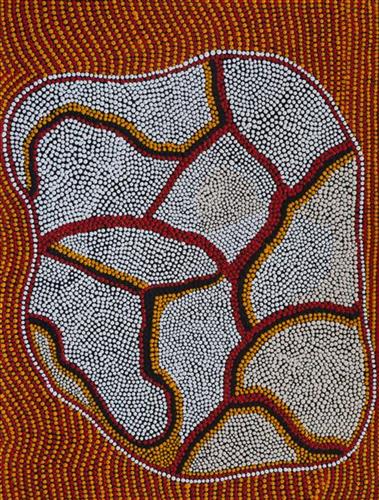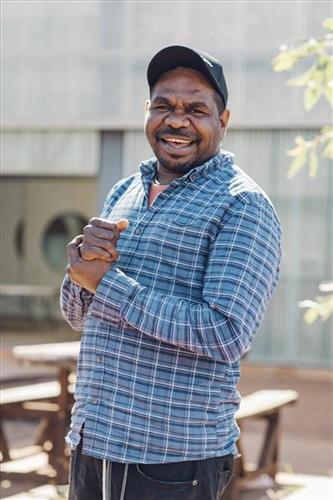111582324797
Pitu (Separation Well)
“Pitu (Separation Well) is my grandfather’s Country, Wikiri is my nanna’s country, GJ (Georgia) Bore is my mama’s country and in the middle is Wantili.
I’m painting the Country. My grandmother and grandfather was from this Country. They walked around eating, hunting, making fire from the spinifex on this Country.
You can see all the way through; GJ Bore to Pitu, with Wantili in the middle. Ngayuku ngurra (my home Country, camp). That’s my home.”
– Brett Bidu
In this work Brett depicts his ngurra. The Western Desert term ‘ngurra’ is hugely versatile in application. Broadly denoting birthplace and belonging, ngurra can refer to a body of water, a camp site, a large area of Country, or even a modern house. People identify with their ngurra in terms of specific rights and responsibilities, and the possession of intimate knowledge of the physical and cultural properties of one’s Country. This knowledge is traditionally passed intergenerationally through family connections. Country for Martu is full of memory; not just the memory of their own movement through it, but also of their family.
Painting ngurra, and in so doing sharing the Jukurrpa (Dreaming) stories and physical characteristics of that place, has today become an important means of cultural maintenance. Physical maintenance of one’s ngurra, like cultural maintenance, ensures a site’s wellbeing, and is a responsibility of the people belonging to that area.
Pitu is an important cultural site and large soak located yulparirra (south) of Wuranu (Canning Stock Route Well 29) and Kulilu rockhole and soak. As a site where fresh water was available all year, Pitu was an important camp and a meeting place for Kartujarra and Manyjilyjarra people during the pujiman (traditional, desert dwelling) era.
Wikiri (Midway Well) is a large soak and claypan located southeast of Parnngurr Aboriginal community. A windmill has been built at the site to access the permanent underground water available there. The many foods and seeds found at Wikiri were left by ancestors in the Jukurrpa (Dreaming), Wirnpa and Jaramarra, rainmaking snakes that now reside around the Great Sandy Desert’s Percival Lakes region, and at the northernmost boundary of Martu Country.
Wantili (Warntili, Canning Stock Route Well 25) is a large round jurnu (soak) and linyji (claypan) near Well 25 on the Canning Stock Route. It is also an incredibly important cultural site, ‘where the creation started.’ (Cyril Whyoulter). The area is dominated by claypans surrounded by tuwa (sandhills), and Nyilangkurr, a prominent yapu (hill) is located on the edge of the claypan. Following rain the typically dry claypans are filled with water, with the overflow from nearby waterholes flowing to Wantili. At that time, Wantili becomes an important place for obtaining fresh water for drinking and bathing. Wantili is significant for the fact that at this site Kartujarra, Manyjilyjarra, Putijarra and Warnman people would all come together for ceremonies during the pujiman era. Many jiwa (stones used by women for grinding seeds) from these times can still be found there today.




